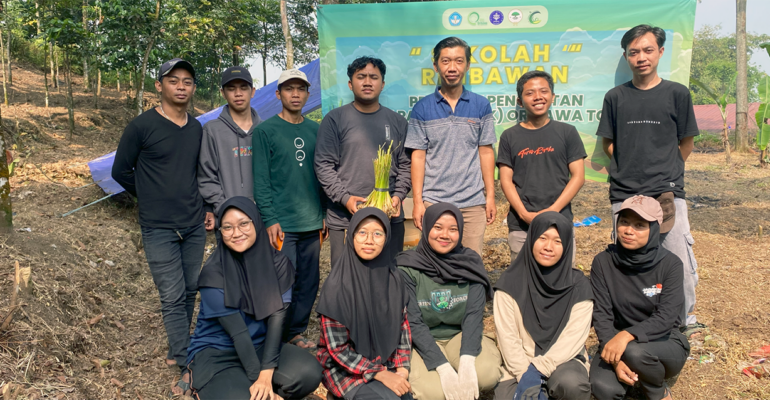School of Foresters TGC IPB University: Planting Vetiver, the First Step to High Value Essential Oil Production

The Student Organisation Capacity Strengthening Program (PPK Ormawa) team from the Tree Grower Community (TGC) IPB University organised the School of Foresters #3 program in the form of planting vetiver and forestry plants, namely mahogany seedlings in Ciasihan Village, Pamijahan District, Bogor Regency, West Java.
Sekolah Rimbawan is one of the PPK Ormawa TGC programmes that aims to increase community capacity in vetiver cultivation and management with the approach taught is 4 Dimensional Agroforestry.
“This vetiver planting is the third activity of the School of Foresters after the previous activities, namely the introduction of vetiver and the making of agroforestry models,” said Chairman of the TGC Ormawa PPK, M Rizki Hadi Pratama in his speech.
This planting activity not only involves the TGC Ormawa PPK team, but also involves various important parties in Ciasihan Village. Several local RW chiefs, the Rimba Pembelajar (Rimbajar) group, and the Chairman of Ciasihan Village-Owned Enterprise (BUMDes) participated in the planting process. Their involvement shows a shared commitment to supporting the programme.
“It is hoped that this collaboration can be a catalyst for improving the welfare of village communities through essential oil production. Involvement in this programme is also an opportunity to improve knowledge and skills in cultivating high-value crops,” Rizki Hadi said.
Rizki pointed out that vetiver was chosen because besides being easy to cultivate, it also has high economic value. “Vetiver is the basic ingredient for making essential oil which has many benefits, both in the cosmetics, perfume, aromatherapy and handicraft industries, and can prevent landslides,” said Hadi.
The planting was done by applying the 4 Dimensional Agroforestry model. In addition to vetiver, the PPK Ormawa TGC team also planted forestry plant seedlings, namely small leaf mahogany (Swietenia mahagoni) to become a fence plant that functions as windbreaks. Mahogany is known as a plant that has many health, environmental, and industrial benefits. Mahogany has high economic value and good ecological impact.
“We will also plant agricultural crops, such as corn. So, it is hoped that the types of plants planted can improve the economy of the Ciasihan Village community,” said Hadi.
Essential oils produced from vetiver have considerable demand in the market, especially in the cosmetics, perfume, and aromatherapy industries. Vetiver essential oil is known for its high quality and distinctive aroma, making it a desirable commodity in both domestic and international markets.
With such great economic potential, vetiver planting is expected to become a new source of income for the people of Ciasihan Village. Not only is a greener and more sustainable environment expected to be created, but also a more economically independent community, with the ability to manage natural resources in a sustainable and future-orientated manner.
“This activity is expected to involve the community from planting to harvesting,” said Ryan as Chairman of BUMDes Ciasihan.
This planting activity is the first step in a series of programmes planned by the PPK Ormawa TGC team. The team will continue to provide assistance to the village community, especially in cultivation techniques, essential oil processing, and product marketing strategies. It is hoped that Ciasihan Village can become a successful example of a local potential-based community empowerment programme conducted collaboratively between universities and the community. (*/Rz) (IAAS/RSL)



